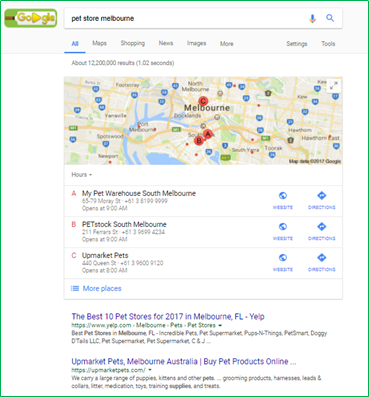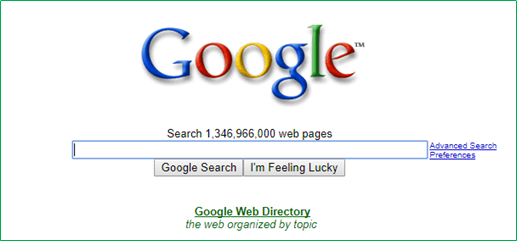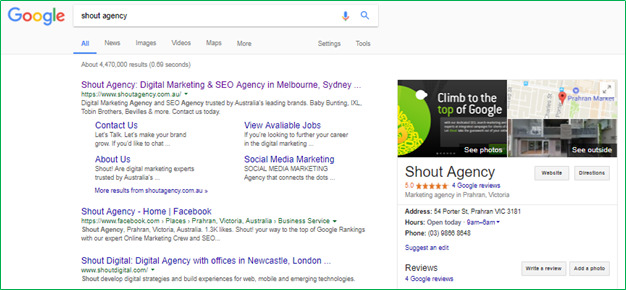You want an advantage in your business. Some way you can outsmart your competitors to gain market share and get additional traffic for less than what your competition paid. You want results without having to give away half the company to achieve this goal.
That is why we want to share some of the growth hacks we learned at Shout for improving organic market share.
1. Improve your page share
Doing search engine optimisation requires that you be a little greedy. Remember every time your business get real estate space on the first page of a Google search, it means your competition does not get shown.
Therefore, you should take advantage of this strategy to get as many slots on the page as possible.
Search Engine Land has a three-step process for improving your page share. It starts by creating a list of keywords you want to prioritize. For example, if you own a pet store, you want to know the specific keywords to be found. Something like Pet store Melbourne or Best Pet Stores in Melbourne.
- Measure your websites page share.
- Measure your top three to five competitors website share. Do an audit of their specific keywords and competitors search share.

2. Optimise different SERP sections
Google is very different from the original search box that graced users when the site first went live. Today, the site has a wide array of results that you can use depending upon your needs.

This means you have multiple ways to be found on Google. For example, visitors can find your site through the following sections:
- Organic listings
- Images
- Videos
- Local (map)
- News
- Books
- Hotels
- Knowledge Graph Profiles
We discussed in the Top 22 Google Ranking Factors different ways to be found. Doing things such as including a keyword in your title tag, URL, and alt text are all different ways to ensure that your site can be found in different ways through Google search.
The key is to discover which method works best for your business to be found online. Then optimise your chances of success with that specific method. Then expand to get blended results from multiple SERP sections.
3. Study the content
Once have identified the different SERP sections and how often your competitors get found in the search rankings, it is time to identify how they are found.
To do this you need to review the keywords each content piece has from your competitors. Then evaluate the impressions for each piece. You can then organize the data, and start coming up with specific content you can create for search traffic.
Note: One thing to keep in mind when you are studying the content. Do not forget that search methods do not work unless you write content for people. By doing so, you improve the search ability and conversions for your content.
4. Reviews and Ratings
While some sites like Moz state that reviews only account for 8% of the search algorithm, they play an even more important role for consumers. That is because consumers have repeatedly stated that they want to be able to trust businesses they are working with online.
Reviews improve your organic market share and provide credibility to your business.
It is also a challenging piece. You need to get your customers to leave positive reviews about your business over a long period of time to have a significant impact.
To do this, you need to focus on the best way to do this through your company’s current systems. If you need some help with this then reach out for a free consultation with us at Shout.
5. Think locally
One of the biggest trends on Google over the past few years has been the shift to more local results. As more and more users search on their mobile devices with GPS enabled tracking, Google mined this information to create locally focused results.
If you want to improve your local results, start by verifying your NAP. Unlike digital content which uses only links to determine the ranking, local companies need citations. A citation is a business’s name, address, and phone number. If this number is not correct, it can have a negative impact on your search results.

For example, if your phone number is wrong then Google will not match up your name and information correctly with the other times you were mentioned online. That is because they match up listing information to determine how often they should share a business on Google local search.
Make sure your information is correct, so they can match you to the correct listing you have on Google.
Next, look at the locations where you want to promote your business. Study your competitors like we discussed above, and then look at which keywords, locations, and competitors are the weakest on Google search.
Finally, list your business on local directories. We discussed above how important the NAP information is to a company. Be proactive to get citations by reaching out to relevant, local directories. The more of these directories like chambers of commerce and other important organisation list your name, the more often you have the potential to gain market share locally.
Use this information to carve out your SEO market share.
Final Thoughts
Improving your organic market share requires a lot of strategy and execution. The growth hacks discussed in this article help you bridge the gap between strategy and execution. Use them to organically grow your SEO market Sydney share on your top keywords.
If you are not sure how to do this, then contact us at Shout for a free consultation session on organic market share optimisation.

